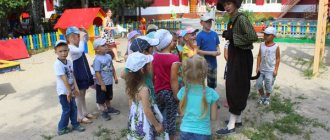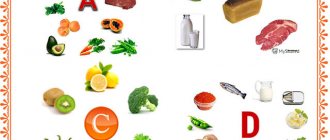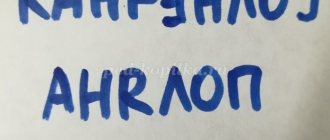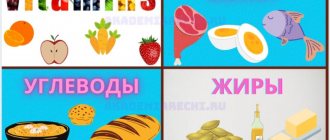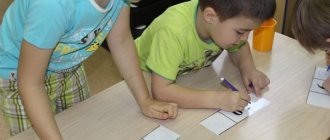Summary of an educational lesson in a preparatory group on the topic: “My hometown”
Summary of educational lesson
in the preparatory group on the topic: “My native city”
Target:
Expand and generalize children’s knowledge and ideas about their city, its historical past, memorable and remarkable places in their city, people who glorified their city - artists, poets, athletes, etc. Activate children's cognitive interest, attention and memory, develop logical thinking and imagination; enrich vocabulary, develop children’s coherent speech; to cultivate a caring attitude towards the history of one’s native city, to cultivate a sense of respect for those who glorified their city; encourage you to strive to study in such a way as to glorify your city in the future.
Vocabulary:
townspeople, symbols, coat of arms, fortress, monument, guide, landmark, problem, architect, famous, famous, talented, architectural, memorable, glorify, strive, cherish, appreciate.
Materials and equipment for the lesson:
cards with words according to the number of children, a map, coats of arms and symbols of your city and other cities, slides with the sights of the city, memorable places, photographs of these places, photographs of famous and famous people of the city, sheets of paper, brushes, paints, pencils for drawing.
Preliminary work:
- Project activity “Native and beloved land” (acquaintance with the history of the native land)
- Excursion to the memorable places of your city; to the city's local history museum
- Conversation with children about the city and the people who glorified it
- Drawing “My Street”, application “My City” (collective)
- Reading poems about your hometown, works of local poets and prose writers.
Working with parents:
- Folder – movement “Our fellow countrymen”
- Consultation “How to introduce children to their native land”
Progress of the lesson:
IN:
Guys, how old are you? How old are your mothers? Dads? Grandmothers? Grandfathers? All people are of different ages. Do you think cities have an age or are they all the same age? How old is our city? (children's answers)
IN:
Guys, are all cities the same or are they different from each other? How to distinguish one city from another? (children's answers).
IN:
By what signs would you recognize your hometown? (children's answers)
IN:
Show it on the map (children show it). What are the people of our city called? (children's answers)
IN:
If you now arrange the word cards in order, you will find out what the word city means:
IN:
How could cities be protected in ancient times? (children's answers). Was our city fenced with a fortress? Why? (children's answers).
IN:
It seems to me that you know a lot about your city. In this case, I want to invite you to the curious club for the game “What? Where? When?" Do you agree? (Yes). Then divide into 2 teams of experts. Captains, take your seats. Now we find out whose team knows more about their city. I will ask you questions. Whose team is faster and, most importantly, answers the question correctly will receive a point, which will be awarded by the jury. At the end of the game, our jury will count the points of each team and name the winner of today's game. Please come up with names for your teams.
IN:
The first task for the teams: tell us what was remarkable about our city in the past, what the people who lived in it did (children’s stories, the jury awards points to the teams).
IN:
The second task for the teams: What will replace what our city is currently known for? (children's stories).
IN:
You know that each city has its own coat of arms, its own symbols. Our city has all this.
D/i “Find and name” (coat of arms, symbols of our city among others). Children explain their meaning. The jury awards points to the teams.
IN:
And now I invite you on a tour of my hometown. We will get acquainted with architectural monuments and visit cultural recreation areas of the townspeople. You will be the only guide. But first you need to check whether you know these memorable places in your city well in order to be a tour guide. I will show you slides with famous places of our city, and you watch and remember. The team that remembers and names them the most will win and earn an extra point (d/i “Remember and name”). They will be the first to conduct the tour.
IN:
Now look at the photographs and choose a place in our city that you will tell us about. (Children choose a photo and talk about the sights of the city, the jury evaluates the children's stories).
IN:
Well, our tour of the memorable places of our city has ended. We "drove" along different streets. Do you remember their names? Let's play the game "Who can name the most streets of their city." The team that remembers the most names is awarded a point.
IN:
Now think about what is good for our streets and what is bad. (D/and “Good - bad” TRIZ).
IN:
Many famous and famous people lived and live in our city. Choose a photo of a person you know and tell us what he became famous for and what he did for our city. (children's stories, the jury awards points to teams).
IN:
Do you think our city has any problems? How can they be solved? (children's answers).
IN:
And now a competition of poems about our city is being announced. (children's answers).
IN:
Well, guys, how much, it turns out, you know about your hometown, how much you love it. Let's think, dream, how will you be useful to your city when you grow up? (children's stories).
IN:
Now let's listen to our jury, who will sum up the results and name the team that will win today's game.
The jury announces the winners and awards prizes. The teacher invites the children to draw their favorite city for the exhibition of children's drawings “My Native City”.
Leisure summary in the preparatory group on the topic: “My favorite city” (with the participation of parents)
Transcript
1 Leisure summary in the preparatory group on the topic: “My favorite city” (with the participation of parents) Program content: expand children’s ideas about their hometown, its attractions; improve the ability to write short stories about the city’s coat of arms; activate children's vocabulary; strengthen children’s skills in intonation and expressive recitation of poetry by heart; develop a sense of rhythm, move in accordance with the nature of the music; instill in children a sense of admiration and pride for their hometown. Materials and equipment: photographs with views of the city; cut image of the coat of arms (of 4 parts) -2 pcs.; cards with numbers; Whatman paper, glue, sheets of colored paper for group work on appliqué; game “Sun” (yellow circle and rays); anthem of the city of Lyubertsy (backing track). Leisure progress. (Children and parents enter the hall to the music.) Presenter: Guys, a telegram has arrived in our kindergarten: “Meet. I'm flying out." I wonder who it could be? Dunno appears Dunno: Hello, guys! You recognized me? (Children's answers) Correct! That’s my name, and I came from another planet, from the Moon. Host: So your homeland is the Moon? Dunno: I don’t know. What is the Motherland and why is it needed? Presenter: Now we, together with the children and their parents, will tell you about this. Presenter: Children, what do we call the Motherland? (The place where we were born, where we live, where we go to kindergarten, where our mothers, fathers, and friends live). Host: Correct! The place where we were born is called the Motherland. The people have composed many proverbs and sayings about the Motherland. Let's remember them, and our parents will help us. (Children begin, and parents finish. For example: a child says: “There is nothing more beautiful in the world,” an adult ends: “Our Motherland,” etc.) “A man without a Motherland is like a nightingale without a song,” “A man has one mother, he has only one Motherland”, “Over the sea it’s warmer, but in the Homeland it’s brighter”, “On a foreign side I’m happy with my little crow”, “On a foreign side even spring is not red”, “Everyone has his own side”, “Everywhere is good, but at home better”, “One’s own land is sweet in sorrow.” Does every person love his homeland? You can only love what you know well. The more we know about our hometown, the more we will love it.
2 Children: 1. You will go around the whole planet. You won’t find a better place. We live together in harmony. Lyubertsy is our common home! 2. My beloved city, My native city, You are green in summer, colorful in autumn. Pure, snow-white You stand in winter, And in spring you are tender. I am proud of you! You may not be the capital, But I love you, And familiar faces make me happy. There are countless cities on this big planet, in the region near Moscow there is the best! Dunno: I understand Lyubertsy is your homeland. This must be a very nice city? Host: Of course, and we’ll tell you about it now. Guys, Dunno has never been to our city, and I suggest first introducing him to our sights. Each child shows a photograph and tells what is depicted on it. Presenter: Well done, guys! Now we need the knowledge of your parents. Addresses adults. Tell me, what should every city have?? (Coat of arms) Child: Our ancient and glorious city has earned its coat of arms through its deeds. The coat of arms was presented to the city for honor, for faithful work. The game “Collect a coat of arms and tell about it” is played (The presenter suggests dividing into 2 teams: a team of parents and a team of children. Each team assembles its own coat of arms from several parts. Parents and children collect a coat of arms and talk about it. (The rising star symbolizes flight to space of Yuri Alekseevich Gagarin, who began his career on the Lyubertsy land; a star directed into the sky indicates the origin and development of helicopter manufacturing in Lyubertsy. The tip is a symbol of the peak, accelerating forward striving. The edge of the tip makes up the letter “L” - capital in the name of the city.
3 Blue color - a symbol of honor, spirituality, lofty aspirations, heavenly expanses - enhances the symbolism of the main figure of the coat of arms. Red color is a symbol of hard work, strength, courage, beauty and celebration. Silver is a symbol of purity, perfection, peace and mutual understanding. Gold is a symbol of creativity and intelligence, wealth, stability, sunshine.) Presenter: Guys and Dunno, look how big and beautiful our city is, what a wonderful Lyubertsy coat of arms. And let the sun shine so that you can better see how many beautiful places we have. Dunno: What is the sun? I have never seen it because there is no sun on the moon. Host: Guys, let's show Dunno our bright sun. (The presenter sets up a bright circle in the middle of the sun without rays.) Children, does this look like the sun? (No) What's missing? (Luchikov) You will say beautiful words about Lyubertsy and our sun will have rays. Children: Our city is beautiful, bright, modern, sporty, working, hospitable, clean, green, big. (For every word the child names, the teacher places a ray of light) Presenter: Look, Dunno, what a radiant sun sparkled over our city. Warm-up “Okay” (children stand in a circle): Is it good that the sun is shining? (depict the sun) Is it good that the wind is blowing? (imitate the wind) Is it good to go with friends? (walking) Is it good to snuggle up to mom? (hug themselves) Is it good in your native land? (spread their arms to the sides) Is it good where our home is? (depict a house) Is it good to dance? (circle) Is it good to be a Lyubertsy resident? (thumbs up)
4 Good! (Dunno pays attention to the numbers.) Dunno: What kind of numbers are these? Host: These are questions for children and adults. A team of children and a team of adults each choose two cards with numbers. I have prepared questions for the teams. Let's find out who knows our city well. (Parents and children choose cards, the presenter asks questions according to the number. (What is the name of the main plant in Lyubertsy? Kamov. What do they produce at this plant? Helicopters. What is the name of the stadium in Lyubertsy? “Torpedo ". What is the name of the Sports Palace? "Triumph")) Dunno: How great are you, how well do you know your city? Is your city famous for its helicopter industry? Do you know how to make helicopters? Children: No, while we are preparing for school to gain good knowledge. But you and I can fly in a helicopter. Game “Helicopter” We get into the helicopter: (children crouch) We go on a flight (start the helicopter) They say: -ZH-ZHU. We are flying above the clouds (arms to the sides) We wave to mom, we wave to dad (they wave with both hands in turn) We see how the river flows (they show the waves with their hands) We see a fisherman in the boat (they cast a fishing rod) Be careful of the mountain (lean left, right) They say: -ZH_ZHU. It's time for us to land (crouch). Let's play a game called “Lyubertsy rhymes” (tell me a word). 1. We came there as a group and stood at his door. We read the sign It was a (museum) 2. We are walking happily through our beloved city. We walk together in pairs and sing a song 3. They rush towards the children: Buses, taxis. And the children really like to walk around the city (to walk)
5 Dunno: I understand why your city is so wonderful, because such friendly people like you live there. I really liked it with you, but, unfortunately, it’s time to fly to my own planet. I will definitely tell my friends about you and your city Lyubertsy. Presenter: Dunno, don’t rush! We want to give you a map of our city as a souvenir. (Parents and children make a collective work “Our city as a gift to Dunno from the Moon” (applique with origami elements) and give it to Dunno.) Presenter: Our journey has also come to an end. We all worked hard and let’s sing the anthem of our hometown together. (Music sounds, children and adults sing the anthem)
